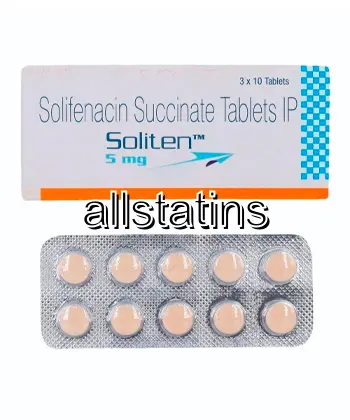| Package | Dosage | Price | Price per Dose | |
|---|---|---|---|---|
| Dosage: 5mg | ||||
| 180 pill | 5mg | $706.82 | $3.93 | |
| 120 pill | 5mg | $493.33 | $4.11 | |
| 90 pill | 5mg | $396.46 | $4.41 | |
| 60 pill | 5mg | $279.85 | $4.66 | |
| 30 pill | 5mg | $172.21 | $5.74 | |
| Dosage: 10mg | ||||
| 180 pill | 10mg | $988.48 | $5.49 | |
| 120 pill | 10mg | $722.96 | $6.03 | |
| 90 pill | 10mg | $559.71 | $6.23 | |
| 60 pill | 10mg | $378.52 | $6.31 | |
| 30 pill | 10mg | $209.88 | $7.00 | |

Solifenacin Description
Overview of Solifenacin
Solifenacin is a medication primarily used to treat symptoms of overactive bladder, such as frequent urination, urgent need to urinate, and incontinence. It belongs to a class of drugs called antimuscarinics or anticholinergics. These medications work by relaxing the muscles of the bladder, helping to reduce the involuntary contractions that cause the urge to urinate. Solifenacin is known for its relatively high selectivity for bladder receptors, which can potentially result in fewer side effects compared to other drugs in its class.
How Solifenacin Works
As a selective M3 muscarinic receptor antagonist, Solifenacin specifically targets receptors in the bladder's detrusor muscle. By blocking these receptors, it prevents abnormal nerve signals that trigger an urgent need to urinate. This action increases the volume of urine the bladder can hold and reduces the frequency of urinary incontinence episodes. The medication is usually taken once daily, making it convenient for patients managing overactive bladder symptoms.
Advantages of Using Solifenacin
Many users find Solifenacin effective in controlling their bladder symptoms. One of its notable benefits is its selectivity, which may lead to fewer side effects like dry mouth, constipation, or blurred vision, common with less selective antimuscarinics. Additionally, its once-daily dosing schedule helps with compliance, and the gradual onset of action allows for stable symptom management. Patients often report significant improvements in quality of life when using this medication consistently.
Potential Side Effects and Precautions
Although Solifenacin is generally well-tolerated, it can cause side effects in some individuals. The most common include dry mouth, constipation, urinary retention, dizziness, and blurred vision. These side effects are usually mild and tend to diminish over time. However, certain patients, especially those with urinary retention issues, gastric retention, or severe liver impairment, should consult their healthcare provider before starting Solifenacin. Regular monitoring may be necessary to avoid complications.
Usage and Dosage Recommendations
The typical starting dose of Solifenacin is 5 mg once daily. Depending on the response and tolerability, the dose can be increased to 10 mg per day. It is important not to exceed the prescribed dose. Patients are advised to take the medication at the same time each day, with or without food. If a dose is missed, it should be taken as soon as remembered unless it's close to the time for the next dose. Patients should follow their healthcare provider’s instructions carefully to ensure safe and effective treatment.
Final Considerations
Solifenacin offers a reliable option for those seeking relief from overactive bladder symptoms. Its targeted mechanism of action and manageable side effect profile make it a preferred choice in many cases. However, as with all medications, it is essential to use it under medical supervision. Patients should inform their healthcare providers about any other medications they are taking or health conditions they have to prevent interactions or adverse effects. Proper use of Solifenacin can significantly improve daily comfort and urinary control.
